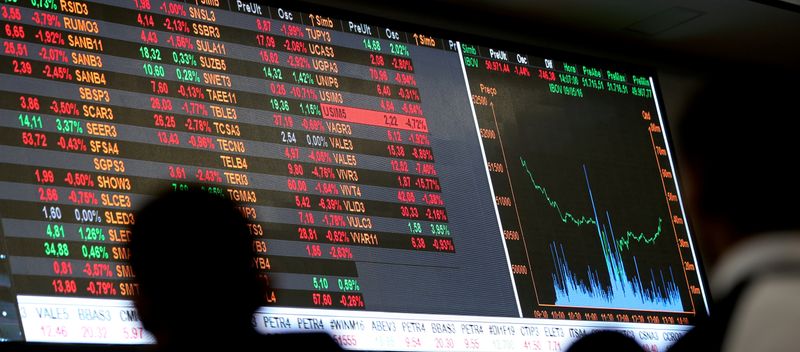By Gabriel Burin and Abraham Gonzalez
BUENOS AIRES/MEXICO CITY (Reuters) - Brazilian stocks will keep slogging through a year that is shaping up as their worst since the global financial crisis of 2008 due to concerns over the handling of the coronavirus pandemic and its impact on local companies, a Reuters survey showed.
In the most likely scenario, the benchmark Bovespa stock index (BVSP) would close this year 22.4% lower than at the end of 2019, further scarring Latin America's No.1 economy, already hit by a recession of historic proportions.
Only three months ago, Brazilian stocks were expected to rise 16.7% in 2020. The Bovespa is down 25.9% so far in the year, on its way to ending a four-year rally that was supported lately by President Jair Bolsonaro's reform plans.
The index is forecast to finish 2020 at 89,700 points, according to the median estimate of 14 strategists and analysts polled May 12-26. Forecasts from 74,792 to 100,000 points implied potential annual losses in the range of 13.5%-35.2%.
The median view would deliver a gain of 4.7% on local equities compared to Monday's closing values, which were still weak even after the index climbed 34.7% from a nearly three-year low in March at the apex of the virus panic.
"With the economy re-opening, the Bovespa can follow a global upward movement but the rise will be mitigated by local political risk," said Ilan Arbetman, an equity research analyst from Ativa Investimentos in Río de Janeiro.
Brazilian stocks have lagged Wall Street's turnaround, fueled by hopes of a quick normalization in U.S. activity. Investors in Brazilian assets remain on edge in the face of persistent turmoil within the government over policy.
The country lost its second health minister in a month after Bolsonaro demanded wider use of unproven anti-malarial drugs to fight the coronavirus in one of the pandemic's worst global hotspots.
Corporate balance sheets have yet to reflect the full impact of quarantine steps adopted mostly in April.
"It will be tough for companies before recovery signs begin appearing in the third quarter," said Arbetman.
Separately, Mexico's S&P/BMV IPC index (MXX) is forecast to close 2020 down about 8% at 40,000 points, in contrast with expectations for gains of more than 10% in a February poll. Risks for Mexican stocks are skewed to the downside.
"We might see some pressure on corporate results for the second quarter. And after that, an increase in volatility due to the U.S. presidential campaign," said Juan Rich, stocks strategy director at Ve por Más in Mexico City.
A growing rift between the government and local business leaders is another source of concern. Last week, President Andrés Manuel López Obrador slammed criticism of new rules giving the state more control in the energy sector.

(Other stories from the Reuters global stock markets poll package:)